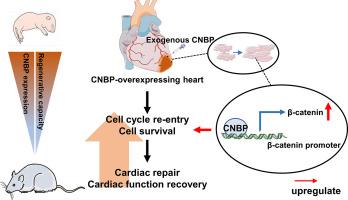当前位置:
X-MOL 学术
›
J. Mol. Cell. Cardiol.
›
论文详情
Our official English website, www.x-mol.net, welcomes your feedback! (Note: you will need to create a separate account there.)
Cellular nucleic acid binding protein facilitates cardiac repair after myocardial infarction by activating β-catenin signaling
Journal of Molecular and Cellular Cardiology ( IF 5 ) Pub Date : 2024-03-01 , DOI: 10.1016/j.yjmcc.2024.02.008 Chong Du , Shan Zhao , Tiankai Shan , Xudong Han , Qiqi Jiang , Jiawen Chen , Lingfeng Gu , Tianwen Wei , Tongtong Yang , Sibo Wang , Hao Wang , Xuejiang Guo , Liansheng Wang
Journal of Molecular and Cellular Cardiology ( IF 5 ) Pub Date : 2024-03-01 , DOI: 10.1016/j.yjmcc.2024.02.008 Chong Du , Shan Zhao , Tiankai Shan , Xudong Han , Qiqi Jiang , Jiawen Chen , Lingfeng Gu , Tianwen Wei , Tongtong Yang , Sibo Wang , Hao Wang , Xuejiang Guo , Liansheng Wang

|
The regenerative capacity of the adult mammalian heart is limited, while the neonatal heart is an organ with regenerative and proliferative ability. Activating adult cardiomyocytes (CMs) to re-enter the cell cycle is an effective therapeutic method for ischemic heart disease such as myocardial infarction (MI) and heart failure. Here, we aimed to reveal the role and potential mechanisms of cellular nucleic acid binding protein (CNBP) in cardiac regeneration and repair after heart injury. CNBP is highly expressed within 7 days post-birth while decreases significantly with the loss of regenerative ability. , overexpression of CNBP promoted CM proliferation and survival, whereas knockdown of CNBP inhibited these processes. , knockdown of CNBP in CMs robustly hindered myocardial regeneration after apical resection in neonatal mice. In adult MI mice, CM-specific CNBP overexpression in the infarct border zone ameliorated myocardial injury in acute stage and facilitated CM proliferation and functional recovery in the long term. Quantitative proteomic analysis with TMT labeling showed that CNBP overexpression promoted the DNA replication, cell cycle progression, and cell division. Mechanically, CNBP overexpression increased the expression of β-catenin and its downstream target genes CCND1 and c-myc; Furthermore, Luciferase reporter and Chromatin immunoprecipitation (ChIP) assays showed that CNBP could directly bind to the β-catenin promoter and promote its transcription. CNBP also upregulated the expression of G1/S-related cell cycle genes CCNE1, CDK2, and CDK4. Collectively, our study reveals the positive role of CNBP in promoting cardiac repair after injury, providing a new therapeutic option for the treatment of MI.
中文翻译:

细胞核酸结合蛋白通过激活β-连环蛋白信号促进心肌梗死后的心脏修复
成年哺乳动物心脏的再生能力有限,而新生儿心脏是具有再生和增殖能力的器官。激活成体心肌细胞(CM)重新进入细胞周期是治疗心肌梗死(MI)和心力衰竭等缺血性心脏病的有效方法。在这里,我们的目的是揭示细胞核酸结合蛋白(CNBP)在心脏损伤后心脏再生和修复中的作用和潜在机制。 CNBP在出生后7天内高度表达,但随着再生能力的丧失而显着降低。 ,CNBP 的过度表达促进 CM 增殖和存活,而 CNBP 的敲低则抑制这些过程。 ,CM 中 CNBP 的敲低严重阻碍了新生小鼠心尖切除术后的心肌再生。在成年 MI 小鼠中,梗塞边界区 CM 特异性 CNBP 过度表达可改善急性期心肌损伤,并促进 CM 增殖和长期功能恢复。 TMT 标记的定量蛋白质组分析表明 CNBP 过表达促进 DNA 复制、细胞周期进程和细胞分裂。从机械角度来看,CNBP 过表达增加了 β-catenin 及其下游靶基因 CCND1 和 c-myc 的表达;此外,荧光素酶报告基因和染色质免疫沉淀 (ChIP) 检测表明 CNBP 可以直接结合 β-catenin 启动子并促进其转录。 CNBP 还上调 G1/S 相关细胞周期基因 CCNE1、CDK2 和 CDK4 的表达。总的来说,我们的研究揭示了 CNBP 在促进损伤后心脏修复方面的积极作用,为 MI 的治疗提供了新的治疗选择。
更新日期:2024-03-01
中文翻译:

细胞核酸结合蛋白通过激活β-连环蛋白信号促进心肌梗死后的心脏修复
成年哺乳动物心脏的再生能力有限,而新生儿心脏是具有再生和增殖能力的器官。激活成体心肌细胞(CM)重新进入细胞周期是治疗心肌梗死(MI)和心力衰竭等缺血性心脏病的有效方法。在这里,我们的目的是揭示细胞核酸结合蛋白(CNBP)在心脏损伤后心脏再生和修复中的作用和潜在机制。 CNBP在出生后7天内高度表达,但随着再生能力的丧失而显着降低。 ,CNBP 的过度表达促进 CM 增殖和存活,而 CNBP 的敲低则抑制这些过程。 ,CM 中 CNBP 的敲低严重阻碍了新生小鼠心尖切除术后的心肌再生。在成年 MI 小鼠中,梗塞边界区 CM 特异性 CNBP 过度表达可改善急性期心肌损伤,并促进 CM 增殖和长期功能恢复。 TMT 标记的定量蛋白质组分析表明 CNBP 过表达促进 DNA 复制、细胞周期进程和细胞分裂。从机械角度来看,CNBP 过表达增加了 β-catenin 及其下游靶基因 CCND1 和 c-myc 的表达;此外,荧光素酶报告基因和染色质免疫沉淀 (ChIP) 检测表明 CNBP 可以直接结合 β-catenin 启动子并促进其转录。 CNBP 还上调 G1/S 相关细胞周期基因 CCNE1、CDK2 和 CDK4 的表达。总的来说,我们的研究揭示了 CNBP 在促进损伤后心脏修复方面的积极作用,为 MI 的治疗提供了新的治疗选择。



























 京公网安备 11010802027423号
京公网安备 11010802027423号